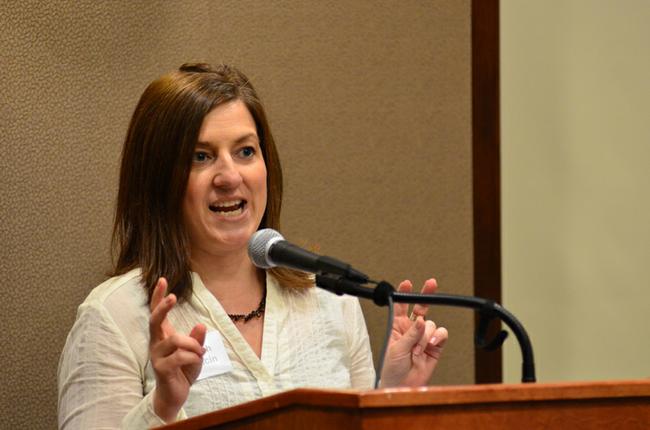Dr. Deborah Hanuscin, an associate professor of science education at MU, did not intend to become a science teacher. Yet now, a 2011 recipient of the William T. Kemper Fellowship for Teaching promotes better science education for students.
On Wednesday night, Hanuscin lectured as part of the Kemper Lecture Series in Memorial Union. Her focus was on the importance of having a mentor, a “Betsy” as she called it, for teachers.
Hanuscin originally was not into science during her school years. After graduating with a degree in elementary education, she taught fourth grade and was paired up with a second grade teacher, Betsy Brown.
Brown focused on teaching science to their students, and Hanuscin discovered new ways to teach science. She became passionate about it, thanks to her mentor-teacher, Brown.
“In education today, we hear a lot about the impact teachers have on their students,” Hanuscin said. “We don’t hear nearly enough about the way teachers inspire other teachers.”
She brought up the MetLife Survey of the American Teacher, in which 44 percent of teachers considered themselves very satisfied with their jobs.
That is the lowest percent in the two-decade history of the survey. A useful question is not why are many teachers dissatisfied, but what leads the satisfied teachers to be highly satisfied, Hanuscin said.
“Teaching is hard, despite the courses that you take, the student teaching experiences you complete and any amount of experience under your belt,” she said. “The job doesn’t get easy.”
Burnout and stress in teachers can be reduced through social support with colleagues, including mentorships, like Hanuscin’s with Brown.
“The good news is that there are lots of Betsys out there,” she said. “They all aren’t named Betsy (though).”
After her lecture, Hanuscin started roundtable discussions in small groups, led by education alumni. These leaders included current teachers, Presidential Award-winning teachers and teaching fellows from around the area, many of whom graduated from MU’s College of Education.
Deana Lankford, who won a Presidential Award for science teaching in 2000, spearheaded one such discussion. She now works with the College of Education’s Office of Science Outreach.
“(Teaching) is the best job you can possibly have,” Lankford said. “Every day is different, every day is exciting. The kids are always fun.”
The table talk turned to the mentors the undergraduates already have.
Junior Meghan Boyle, an elementary education major, has an older sister who is a teacher already.
“I feel like she’s my mentor already,” Boyle said. “We’re both very brutally honest.”
Sophomore Katie Schlichter comes from a family of educators. The elementary education major is doing pre-service, or student-teaching, in a kindergarten class.
“My mom’s a teacher,” Schlicter said. “(She) will give me ideas to help the kids and (for) different programs.”
Each of the education majors at the table had different reasons for how and why they decided to teach.
“I really want to do kindergarten,” junior Amanda Terschluse said. “I like how it’s a brand new thing for them, and (you) not only teach them but teach them the basics of school, like raising your hand and getting in line.”
Sometimes there is an epiphany in which education seems right. Originally an education major, junior Taylor Thomas, switched to the business school because international studies interested her.
“I realized ‘What am I doing?’” Thomas said.
She then switched back to education and is now an elementary education major.
Boyle grew up saying she wanted to be a teacher.
“I made my mom and dad get me a little school desk,” she said. “I had gradebooks. I was always playing the teacher.”







